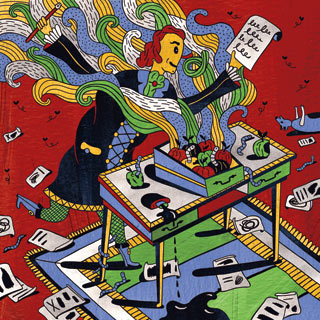
One of the many pathetic ways I shore up my self-esteem in the face of life's cosmic meaninglessness is by collecting anecdotes about the eccentric work habits of great historical figures. I love finding out that Churchill frequently stayed in bed till 11am, that Kafka was a time-management disaster, or that Friedrich Schiller tried to improve his concentration by inhaling the fumes from rotten apples he kept in a drawer. If even these paragons managed their lives in such peculiar ways, my theory goes, there's no need to worry that I do, too. One example: since university, I've been unable to start working except on the hour or the half-hour – or, on a good day, the quarter-hour. If I miss it, I have to wait. On a really bad day, not starting by 9am might see me procrastinate till noon, which somehow feels like a nice, clean-edged moment at which to try again.
Straw polls among friends suggest that this specific weirdness isn't widespread – but also that, more generally, clock time exerts some powerfully irrational effects: we're seemingly far more influenced by what time it is than we'd like to admit. By far the most troublesome, for anyone with any degree of control over their working hours, is the horrible lure of "calling off the day". In some inexpressible way, 3pm or thereabouts (when this demon usually attacks) just feels like a bad time to begin or recommence work on big projects. Best wait till tomorrow, you tell yourself: deal with minor matters for the rest of today, and get stuck in in the morning.
There can be good reasons for this, it's true. One persuasive criticism of traditional time-management techniques is how they wrongly assume that time is "fungible" – that one hour's the same as any other. In reality, by contrast, energy levels fluctuate. ("With all those hours you spend watching TV," the stereotypical motivational coach admonishes, "you could have written a novel!" But you probably couldn't, because those were hours of tiredness.) Maybe sometimes you really do lack the gumption to work past 3pm on anything except emails and desk-tidying. But the very fact of the time of day seems to possess its own power, too. And, like many procrastinatory urges, it's sneaky, because it masquerades as self-discipline: conserving your energy for a fresh start tomorrow feels virtuous, while in fact erecting an obstacle to getting down to the projects you care about most. The only workable antidote I've found is as geeky and eccentric as the behaviour itself: mentally, and often in a notebook, too, I divide the afternoon into two-hour slots: 12-2, 2-4, 4-6. That way, if my motivation collapses at 3, I can "call off" that block, then start afresh at 4.
Since far too much productivity advice these days seems to assume that productive work is all that matters in life, let's be clear: "calling off the day" to go and join friends in the local beer garden – or to do anything else that's similarly fun or enriching – is an actively good thing (providing it won't get you fired). You should do it a lot. What you shouldn't do is fail to make progress on what matters because of what it says on your wristwatch. Don't head to the beer garden because you're postponing the important stuff till tomorrow, in other words. Head to the beer garden because it's important in itself.
oliver.burkeman@theguardian.com

